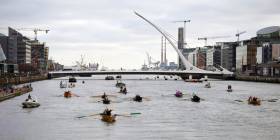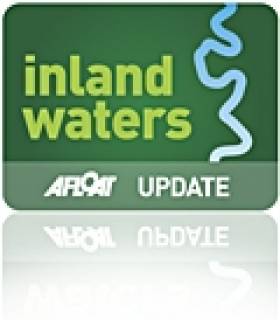Displaying items by tag: Irish Underwater Search and Recovery Unit
Charities Benefit as Flotilla Takes to Liffey This Saturday
#Rowing: The second annual All-in-a-Row charity event on the River Liffey will be held this Saturday, December 9th. Rowers, kayakers and canoeists will take part in a row or paddle to raise money for the RNLI and The Irish Underwater Search and Recovery Unit. The course runs from the Tom Clarke Bridge (formerly the East Link) to Grattan Bridge, and the event will start at 8 am and end at 3.30. There will be a base at St Patrick’s Rowing Club.
There is a link for those who wish to donate on allinarow.ie.
The RNLI provides a rescue service at sea, along with education and supervision on beaches. It sets out to influence other organisations, policy-makers and regulators, throughout Ireland, England, Scotland and Wales. The RNLI provides a 24-hour search and rescue service to 100 nautical miles out from the coast of Ireland and the UK.
Ninety five per cent of RNLI people are volunteers. RNLI crews and lifeguards have saved over 142,000 lives since the institution was formed in 1824. They have 46 Lifeboat stations around the Republic of Ireland and Northern Ireland and four inland lifeboat stations, at Lough Derg, Lough Ree, Lough Erne and Strangford Lough.
RNLI statistics (2016): 1,136 launches; 1,649 people rescued; 37 lives saved; on average 28 people rescued per week.
The Irish Underwater Search and Recovery Unit (IUSRU) is a charity registered in the Republic of Ireland.
When persons go missing in rivers, canals, lakes or around our coasts they require specialist equipment and personnel to bring them home. The IUSRU is made up of a dedicated team of volunteers who search for missing people underwater and recover them so they can be given a dignified resting place.
The IUSRU was formed in January 2012 to provide a professional, dedicated and highly trained service that could carry out the task of recovering missing persons with compassion and sensitivity.
In 2014 there were 114 recorded deaths through drowning in Ireland.
Entries Open For IUSRU Raft Race at Docklands Summer Fest
#InlandWaterways - The Irish Underwater Search and Recovery Unit (IUSRU) has announced details of its Raft Race as part of the Waterways Ireland Docklands Summer Festival.
Entry is €25 per person with four persons per raft for the day of wackiness on the water at Grand Canal Basin on 19 May.
And for those who can't build their own raft in time, prebuilt rafts can be supplied by the organisers.
More details of the event can be had from the IUSRU at 087 975 8656 or [email protected].
The complete programme of events for the Docklands Summer Festival will be posted on the official website shortly.































































